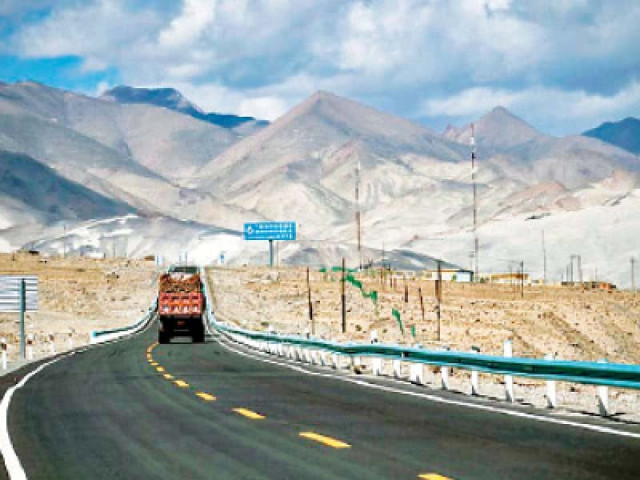Talks begin to roll over $3b CPEC debt
Pakistan, China also agree to hold long-delayed JCC meeting

Pakistan and China have begun talks for the rollover of $3 billion worth of China-Pakistan Economic Corridor (CPEC) debt and have also agreed to hold a much-delayed meeting of the CPEC strategic committee, Khalid Mansoor, an aide to the prime minister, said on Monday.
An announced delay in holding the 10th meeting of the Joint Cooperation Committee (JCC) of CPEC and Pakistan’s discomfort with payment of upcoming debt of CPEC energy projects was sending negative signals about the government’s seriousness towards the multibillion-dollar strategic initiative.
For the restructuring of debt of CPEC energy projects, “talks with Chinese authorities have begun for a win-win situation”, said Special Assistant to Prime Minister on CPEC Affairs Khalid Mansoor while addressing his maiden press conference.
He maintained that Pakistan was committed to making payments against the Chinese investment in energy sector projects.
A diplomatic source told The Express Tribune that debt rescheduling talks were at a very initial stage.
Mansoor last month replaced Asim Saleem Bajwa as Pakistan’s focal person on CPEC. But Mansoor has not yet been notified as chairman of the CPEC Authority.
In May this year, Special Assistant to PM on Power and Petroleum Tabish Gohar told The Express Tribune that in order to eliminate the need for increasing power tariff by Rs1.50 per unit, the government would request China to roll over nearly $3 billion in principal loan repayments to 12 Chinese independent power producers that were due in three years.
Gohar said that Pakistan would seek deferment of the $3 billion repayments for 10 to 12 years, which in turn would reduce the tariff increase requirement by Rs1.50 per unit.
China has set up 12 power plants under CPEC and the repayment of Chinese debt is included in electricity tariffs. Consumers will pay them in rupees and the government will return them in dollars.
Debt payments are due against Kohala hydropower project, Karot hydropower project, Suki Kinari power project, Port Qasim power project, Sahiwal power plant, Hubco power plant and Engro power generation project among others.
In addition to the $3 billion in principal payments, the dividend payments also stand at $1.5 billion during the next three fiscal years.
Against inflows of $19 billion, the outflows from CPEC power projects are estimated at over $31 billion on account of both dividend and debt repayments over a period of 20 years, as per documents of the planning and development ministry from December 2018.
Commercial loans for setting up power plants had been arranged at an interest rate of London Interbank Offered Rate (Libor) plus 4.5%. However, it is the return on equity, which in some cases is as high as 34.2%, that will cause an outflow of $11.3 billion.
Mansoor said that the Chinese embassy had conveyed September 23 and 24 as the dates for holding the 10th meeting of JCC.
After nine Chinese citizens were killed in an attack, China had abruptly postponed the 10th JCC meeting in July this year.
The 10th JCC meeting is seen as critical for what is called re-energising CPEC, making the CPEC Long-Term Plan 2017-30 effective and to address issues being faced by Chinese companies working on CPEC projects, including a delay in clearing their power generation dues.
The provision of security to Chinese nationals and CPEC assets is also included in the agenda of the 10th JCC meeting. The JCC meeting has been scheduled after a gap of almost two years.
Both sides will take up all issues that caused CPEC to slow down in the past three years. A total of 27 projects, 17 fast-track and 10 priority ones, had been identified for development under the first phase of CPEC seven years ago.
The fast-track projects had been marked to be completed within the first year and the priority projects were planned to be completed within two to three years.
However, after seven years of CPEC, only four fast-track projects have been completed while work on the remaining six was under way.
The federal government blames Covid-19 for the slow progress on CPEC projects but analysts said that the Pakistan Tehreek-e-Insaf (PTI) government has pushed CPEC on the backburner as a policy.
So far, $25 billion worth of investments had been made under CPEC and out of that $13 billion worth of projects had already been completed, said Mansoor.
He said that the remaining $12 billion worth of projects would be completed in one year, indicating a delay of at least four years compared with their original schedules.
The SAPM said that during the past two months, he had tried to resolve the issues being faced by the Chinese investors. He said that Chinese companies had made $845 million investment in the past three years.
Published in The Express Tribune, September 14th, 2021.
Like Business on Facebook, follow @TribuneBiz on Twitter to stay informed and join in the conversation



















COMMENTS
Comments are moderated and generally will be posted if they are on-topic and not abusive.
For more information, please see our Comments FAQ